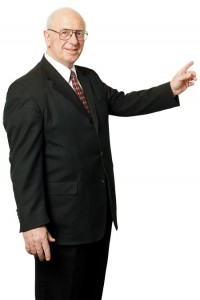You’ve likely heard more than a few church talks over the years—some you have loved and some, well, that left a bit to be desired. You’ve also likely given a few church talks of your own—one or two of which may have fallen into the latter category. Every semester religion professor Randy L. Bott (EdD ’88) teaches more than 800 BYU students how to become masterful Sunday orators. The lesson is a signature part of Bott’s ever-popular mission prep course.
Q: How did you come up with your method for preparing a sacrament meeting talk?
A: It wasn’t until I entered the doctoral program in educational leadership at BYU that I was taught . . . the process of “four-folding knowledge.” It lays out the four elements every talk should have. [In his dissertation, Bott compared the effectiveness of the four-fold method with three other strategies; he found that people taught with this method retained more information.]
Q: What are the four elements a sacrament meeting talk should have?
A: Purpose, main ideas, expansion or validation, and testimony.
Q: How can I use these four elements to develop a talk?
A: Once a person has the purpose, the rest of the talk is easy. If someone gave me the topic of faith, I would immediately try to narrow the scope. For the purpose, for example, I would come up with a statement like “The purpose of my talk is to teach people how to recognize the power of faith in their own lives.”
I might have only one or two main ideas that support this purpose. One might be “Faith is the very motivating power that enables us to act.” A second main idea might be “I can increase faith by recognizing it in my life.” I would expand or validate the first main idea with stories, scriptures, or examples of faith. Then I would do the same thing for the second main idea.
The last piece is testimony. At this point I would honestly evaluate how strongly I feel about the principle I am teaching and then testify about that principle.
Q: You’ve said this method can be used to write any talk in five minutes or less. What’s the fastest you’ve prepared a talk?
A: When I served as a mission president in California, a General Authority asked me halfway through the rest hymn [in a multi-regional priesthood leadership meeting] to give a 20-minute talk; I guess I had a minute or less to prepare. I talked for 20 minutes, sequencing through the four elements described above, bore my testimony, and sat down. He then said, “You are a master at that!” to which I responded, “I am actually a doctor at that—that was part of my dissertation.”










